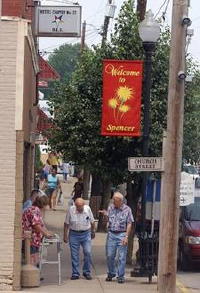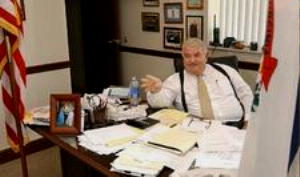TEFLON TOWN - Spencer Finds A Way To Survive Plant Closures

The Roane County town of Spencer
is facing life without its second-
biggest private employer, but has
weathered painful job cuts before.
(Photo by Chip Ellis)
Staff Writer Joe Morris
www.wvgazette.com
SPENCER â Losing one of its biggest employers might devastate any other small town, but Spencer has been through it before, and always found a way to recover.
"We've had some tough times," says longtime Mayor Terry Williams. "We've always been able to survive. It's easy to quit."
The Roane County town's No. 2 private employer, Spencer Veneer LLC, announced last month that it would close after seven years, leaving 130 people out of work.
But even before operations wind down, area employers are vying to hire about a third of the workers, Williams said, and the county's development office is already negotiating with two other veneer companies interested in taking over the plant, which slices logs into veneer for furniture and fixtures.
Spencer, a town of about 3,000, has become something of a model for West Virginia municipalities in coping with the manufacturing retrenchment of the past 20 years.
Since 1989, it has lost more than 1,000 jobs in a series of closures: the hubcap maker Norris Industries and Spencer State Hospital in the late '80s, and an aeronautics equipment plant run by Goodrich Corp. and the Kellwood Corp. sweater factory in the early part of this decade.
But it has added jobs in other sectors, namely the natural gas industry and retail business.
Spencer-based Contractor Services Inc., an oil and gas contractor, and Harts Oil Co. have been adding jobs amid an energy boom, says Mark Whitley, director of the Roane County Development Authority. Roane Hardwoods Inc. and Heeter Construction Inc. are also among Spencer's bigger employers.
The arrival of a Super Wal-Mart in 2000 spurred a retail resurgence, Williams said. Spencer now has four independently owned specialty restaurants, disproportionately large in light of the town's size, Williams said, and it draws shoppers from nearby counties.
"Wal-Mart has been a great boost to the community," he said. "I know it's not seen as that by other towns, but it's been great here."
One retail niche Spencer has carved out for itself is antiques. The town bought an old McCrory's department store and gave it to the Roane County Development Authority, which then turned it into an antiques mall that's thriving, Williams said.

We've had some tough times," says longtime
Mayor Terry Williams. "We've always been able
to survive. It's easy to quit." (Photo by Chip Ellis)
And this spring, Charleston-area antiques dealer and auctioneer Randy Atkinson opened Town Square Antique Mall with business partner Elizabeth Mahney just down Church Street from the city antiques mall.
"The Charleston business climate is nowhere near what it is in Spencer," Atkinson said. "It's just a better area for antiques, with more dealers and more people interested." After eight weeks in business, he said, "our foot traffic is double what we'd have in Charleston."
But Spencer has also proved adept at preserving what manufacturing it has.
The old Monarch Rubber Co.'s facility had operated in Spencer for 55 years when, in 2005, it was sold to Armacell LLC, a Mebane, N.C., maker of insulation, specialty foam and other rubber products. The purchase came at a time when Monarch was shrinking operations in the Spencer plant.
Railroad-tie maker Burke-Parsons-Bowlby Corp., outside Reedy, also remains a major employer, with about 100 on payroll. Spencer's biggest employer is Roane General Hospital, which employs about 250.
Over the past 20 years or so, Spencer has found a way to hold its population steady, Williams said. Other West Virginia municipalities down on their luck too often stagnate, but Spencer has reinvested in beautification projects and water and sewer upgrades, he said. It never let itself act like a doomed town, he said.
"We're survivors, and we're pretty good at what we do," he said.
There's good reason to believe that the Spencer Veneer plant could find a new operator.
The 268,000-square-foot facility was itself formerly home to the Norris Industries hubcap plant. But today it's "a state-of-the-art veneer plant," Whitley said.
Two veneer companies have contacted Whitley about taking over, he said, though he wouldn't identify them. And several others have asked about buying the plant's equipment, which includes an operational saw mill, de-barker, kilns, vats for soaking wood, slicers and driers, all worth about $14 million, Whitley said.
The state, in fact, filed suit last month to block Spencer Veneer from removing the equipment because the company was behind in repaying a 6-year-old $2.35 million loan and it had used the plant equipment as security for the debt.
After a Roane County Circuit Court judge granted the state Economic Development Authority a temporary restraining order, the two sides agreed to work on resolving the issue outside of court, calling a halt to the lawsuit.
Spencer Veneer was facing tough competition from Chinese plants as well as a business slowdown resulting from the decline in U.S. housing starts, Whitley said.
Plant officials wouldn't answer questions.
Whitley said it was his understanding that the plant closed because it couldn't replace an existing line of credit or land working capital to keep operations running.
The plant's record on worker safety suggests some problems.
One plant worker died when he fell 10 feet from a platform, and another's scalp was torn from her head when her hair was caught in a belt attached to a log slicer. The plant has been cited for 69 violations by the federal Occupational Safety and Health Administration since opening, according to the agency's Web site.
If the plant doesn't find a new operator, the area is likely to absorb at least some of the workers, Whitley says.
"The labor market was getting a little tight," he said. "They're great employees, and [area employers] will try to take advantage."
Even the city is looking to hire a few of them, said Williams, who's been mayor for 30 years.
One thing keeping the town from growing more is its remoteness from interstate highways, he said.
"Transportation is a big key," he said. "Industry has told us it would be interested in coming here" if the town were more accessible.
Now, Williams said, he's pushing for state and federal funding for a project to flatten three to four miles on W.Va. 33 connecting Spencer to the Interstate 77 junction in Ripley.
"It would be a nice piece of a big puzzle to get completed," Williams said.
To contact staff writer Joe Morris call 348-5179.